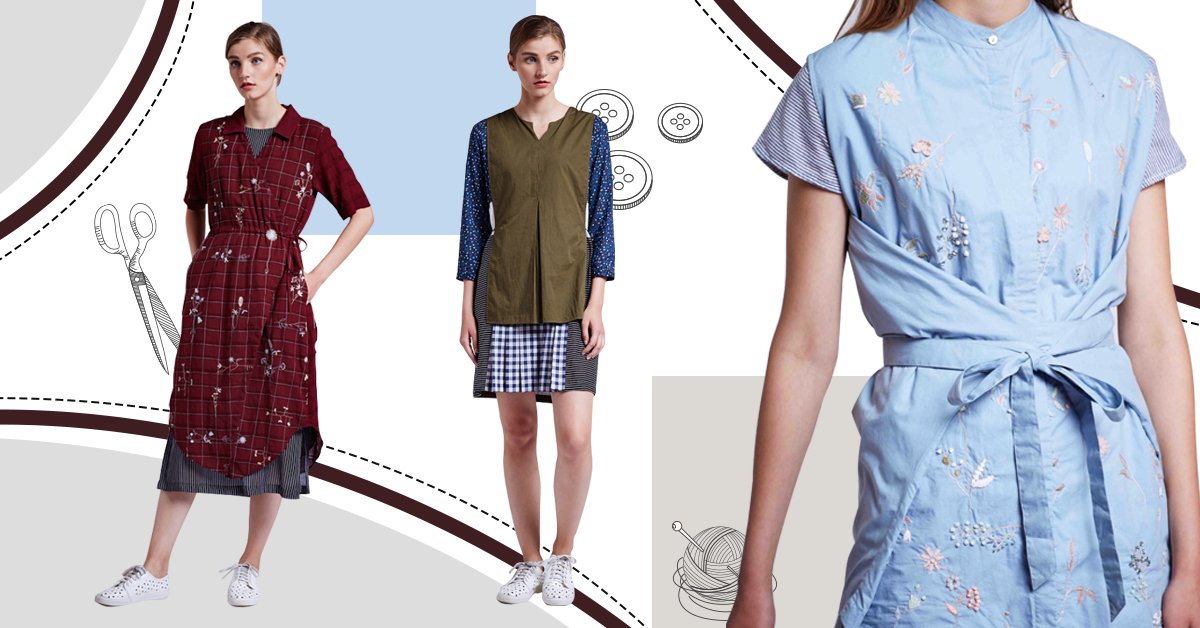
While fast fashion has taken the front row and hoarding on trends has become the new cool, there are sustainable fashion brands trying to change the game. Doodlage, being one of them. The brand is known for upcycled clothing and using natural fibres to create ethical garments. Kriti Tula, founder and creative director of the brand believes that sustainable fashion isn’t a new concept. “This is where we started from. 15 years back, I was given my sister’s old clothes to wear till they finally became dusting cloth. Even wedding wear was upcycled to create a number of different pieces from a single outfit. These are things we’re all familiar with,” she says.
How did Doodlage happen?
Doodlage in collaboration with Lifaffa – a corset belt made from upcycled plastic bags.
Kriti got the idea while interning with mass producing brands and export houses. “After graduating from Pearl in 2010, I worked with a number of export houses and noticed a lot of fabric was getting wasted at every level of production – cutting, stitching and piece rejection. I knew that I wanted to work on something that already exists and supports a circular economy.” She started the label in 2012 but actively started working on it in 2014.
What does the name ‘Doodlage’ signify?
“We make our garments from from factory waste and it comes in all shapes and sizes – squares, side wastages and more. Designers and skilled craftsmen put these pieces together, almost like a puzzle. Just like everyone has a unique way of doodling, and they never know what the end result of a doodle will be, our designs are unique and that’s exactly what adds character and individuality to our garments. Hence, the name Doodlage.”
Dreams and Dystopia…
At the LFW’17, Doodlage presented its ‘Dreams And Dystopia’ collection and the eye catching headgears absolutely stole the show! So what was the idea behind the theme? “The collection signifies the chaotic lives we all lead. Social media, activism and pollution – all of which are now a part of everyday lives. If you notice the designs, you see that the underlayers are checks and patchwork while the overlayers are floral that signifies hope. Hope for a better future in this chaotic world.”
Why do you feel that so many people never really ask where their clothes come from?
“People are made to believe that ‘retail’ is a form of therapy. Everyone wants to look good for less, wear a new piece of clothing when they step out and this ideology has made people very ignorant.” A huge part of sustainable fashion is giving back to the artisans who work on the clothes we wear and with ‘retail therapy’ becoming an actual thing, post consumer waste designers like Kriti agree that people need to be made more aware of the production process. “They don’t know who is making their clothes because it’s not happening in front of them. The consumer is unaware of the fabrics used and the carbon footprints this industry has. We need bigger brands to talk about their recycled collections to educate people about the industry.” she added.
Do you think sustainable fashion will ever be commercialised in a good way?
“Not too soon. I have nothing against fast fashion but since it’s more accessible, it is feeding a lot of mouths and reaching a lot more people. For instance, Levis came up with denim jeans made from plastic bottles and H&M have a sustainable line that they’re really pushing. Unless bigger brands come together and take the initiative, it will take a long time to reach out to the masses.”
What’s in store for fans of ‘Doodlage’?
“We want to branch into other product lines, make sustainable fashion more accessible to them. We also aim to build the brand into something much bigger and motivate other labels to make recycling cool again!”
The label is also getting a lot of love from celebrities! Need proof? Here you go…
We’re loving the support!
Read More From Fashion
Wedding Outfit Ideas From Our Fave Bloggers To Be The Best-Dressed This Shaadi Season!
Isha Jain
Stylish Aakruti Sejpal Just Made Mirror Veils The Coolest Bridal Trend Ever!
Isha Jain